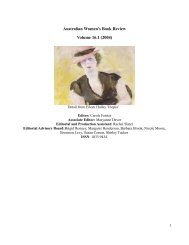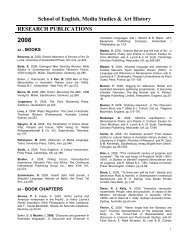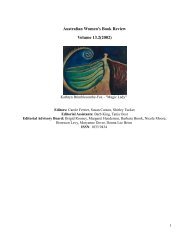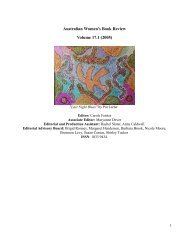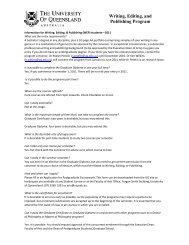Australian Women's Book Review Volume 14.1 - School of English ...
Australian Women's Book Review Volume 14.1 - School of English ...
Australian Women's Book Review Volume 14.1 - School of English ...
Create successful ePaper yourself
Turn your PDF publications into a flip-book with our unique Google optimized e-Paper software.
What Do You Mean by Your Country?<br />
Sylvia Lawson, How Simone de Beauvoir Died in Australia: Stories and Essays. Sydney: University <strong>of</strong><br />
New South Wales Publishing, 2002.<br />
<strong>Review</strong>ed by Shirley Tucker.<br />
Reading a collection <strong>of</strong> stories and essays by one author can be a bit like listening to an album by one<br />
artist. There are tracks you routinely skip - not because they are necessarily inferior to the ones you<br />
don't, but because they are simply not to your taste. Sylvia Lawson's provocatively titled collection,<br />
How Simone de Beauvoir Died in Australia reminds me <strong>of</strong> such albums; albums that cover a vast array<br />
<strong>of</strong> genres, styles and themes in an attempt to showcase the versatility <strong>of</strong> the artist and demonstrate their<br />
mastery <strong>of</strong> everything possible in music.<br />
It's not that Lawson isn't a great cultural critic and writer. Taken individually, each story/essay is<br />
intelligent and engaging (except perhaps for 'Putting the books away with Jack' the one where she sorts<br />
her books with her son according to various ambiguous disciplinary categories), and each story<br />
investigates important questions <strong>of</strong> nation, identity, politics and culture. It's just that despite these<br />
pressing <strong>Australian</strong> preoccupations, the overall sequence or continuity is somewhat incoherent because,<br />
I think, the integration <strong>of</strong> these themes into each story/essay is so elusive. It's hard work making the<br />
connections but you can't help responding to the not quite concealed demand that you bloody well<br />
make the connections.<br />
Perhaps the book's suggestive cover, with a title that promises the<br />
fantasy <strong>of</strong> Simone, albeit dead in Australia, positioned above an<br />
Aboriginal art graphic, perfectly contextualises the vast array <strong>of</strong><br />
genres, styles and topics within. The overall organising principle for<br />
this collection is announced in the epigraph to the Introduction<br />
where an interviewer asks Noam Chomsky whether the time might<br />
come when we are no longer ashamed <strong>of</strong> our country and Chomsky<br />
replies 'it depends what you mean by your country'. The ensuing<br />
investigation <strong>of</strong> 'our country' provides an interesting, if not unusual,<br />
journey into the thoughts and observations <strong>of</strong> Lawson.<br />
Using a mix <strong>of</strong> fact, fiction and autobiography, Lawson investigates<br />
the extent to which increasingly repressive ideological conformity<br />
has eroded any sense <strong>of</strong> social democracy. While the tone is<br />
optimistic rather than gloomy, she is clearly concerned about the<br />
disappearance <strong>of</strong> the dissenting voice as she moves us through a<br />
wide range <strong>of</strong> settings; Alice Springs, East Timor, Indonesia, West<br />
Papua, Britain and France, to emphasise this point. Despite the<br />
many problems she observes as a consequence <strong>of</strong> this loss <strong>of</strong> critical voice, she manages to maintain<br />
positive about the future through her own good faith in people generally. For example, though she<br />
explains that our nation-building efforts (characterised by corroboree, Snowy River horse riders in<br />
Akubras and Drizabones, and the lawnmower ballet at the opening ceremony <strong>of</strong> the 2000 Sydney<br />
Olympic Games) are largely symbolic, she argues that we read symbols accurately and we 'know full<br />
well what we're doing when symbolic action is called for' (5). Thus the meaning <strong>of</strong> Cathy Freeman's<br />
54



